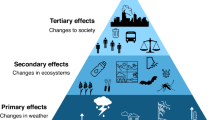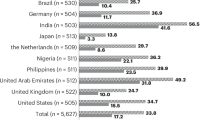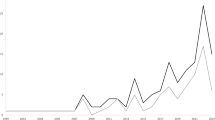Abstract
Climate change and adaptation are inextricably connected to justice and equity. Often, researchers and decision-makers conceptualize climate justice through frameworks of distributive and procedural justice, which have been central to environmental justice discourse for decades. However, critical race theory provides alternative perspectives. Here I identify three themes that are most salient to climate change adaptation discourse: (1) racialization and race consciousness, (2) racial capitalism and (3) intersectionality. By drawing on these themes, I articulate a framework to analyse how racialized climate injustices are reproduced and can be ameliorated. As this Perspective demonstrates, climate adaptation informed by critical race theory can effectively challenge dominant systems of marginalization in contrast to status quo adaptation practices that uphold inequitable power dynamics.
This is a preview of subscription content, access via your institution
Access options
Access Nature and 54 other Nature Portfolio journals
Get Nature+, our best-value online-access subscription
$29.99 / 30 days
cancel any time
Subscribe to this journal
Receive 12 print issues and online access
$209.00 per year
only $17.42 per issue
Buy this article
- Purchase on SpringerLink
- Instant access to full article PDF
Prices may be subject to local taxes which are calculated during checkout

Similar content being viewed by others
References
Althor, G., Watson, J. E. M. & Fuller, R. A. Global mismatch between greenhouse gas emissions and the burden of climate change. Sci. Rep. 6, 20281 (2016).
Füssel, H.-M. How inequitable is the global distribution of responsibility, capability, and vulnerability to climate change: a comprehensive indicator-based assessment. Glob. Environ. Change 20, 597–611 (2010).
IPCC Climate Change 2022: Impacts, Adaptation and Vulnerability (eds Pörtner, H.-O. et al.) (Cambridge Univ. Press, 2022).
Anguelovski, I. et al. Equity impacts of urban land use planning for climate adaptation: critical perspectives from the Global North and South. J. Plan. Educ. Res. 36, 333–348 (2016).
Swanson, K. Equity in urban climate change adaptation planning: a review of research. Urban Plan. 6, 287–297 (2021).
Fedele, G., Donatti, C. I., Harvey, C. A., Hannah, L. & Hole, D. G. Transformative adaptation to climate change for sustainable social–ecological systems. Environ. Sci. Policy 101, 116–125 (2019).
Schrock, G., Bassett, E. M. & Green, J. Pursuing equity and justice in a changing climate: assessing equity in local climate and sustainability plans in US cities. J. Plan. Educ. Res. 35, 282–295 (2015).
Shi, L. et al. Roadmap towards justice in urban climate adaptation research. Nat. Clim. Change 6, 131–137 (2016).
Coggins, S. et al. Empirical assessment of equity and justice in climate adaptation literature: a systematic map. Environ. Res. Lett. 16, 073003 (2021).
Rudge, K. Participatory climate adaptation planning in New York City: analyzing the role of community-based organizations. Urban Clim. 40, 101018 (2021).
Schlosberg, D. Defining Environmental Justice: Theories, Movements, and Nature (Oxford Univ. Press, 2009).
Carbado, D. Critical what what? Conn. Law Rev. 43, 1593–1643 (2011).
Gotanda, N. A critique of ‘our constitution is color-blind’. Stanford Law Rev. 44, 1–68 (1991).
Guinier, L. & Torres, G. The Miners Canary: Enlisting Race, Resisting Power, Transforming Democracy (Harvard Univ. Press, 2002).
Antwi-Agyei, P., Amanor, K., Hogarh, J. N. & Dougill, A. J. Predictors of access to and willingness to pay for climate information services in north-eastern Ghana: a gendered perspective. Environ. Dev. 37, 100580 (2021).
Djoudi, H. et al. Beyond dichotomies: gender and intersecting inequalities in climate change studies. Ambio 45, 248–262 (2016).
Gonzalez, C. Racial capitalism, climate justice, and climate displacement. Oñati Soc. Legal Ser. 11, 108–147 (2020).
Taylor, M. The Political Ecology of Climate Change Adaptation: Livelihoods, Agrarian Change and the Conflicts of Development (Routledge, 2014); https://doi.org/10.4324/9780203762486
Webber, S. Climate change adaptation as a growing development priority: towards critical adaptation scholarship. Geogr. Compass 10, 401–413 (2016).
See, J., McKinnon, K. & Wilmsen, B. Diverse pathways to climate change adaptation through a postdevelopment lens: the case of Tambaliza Island, Philippines. Clim. Dev. 14, 945–956 (2022).
Crenshaw, K. Race, reform, and retrenchment: transformation and legitimation in antidiscrimination law. Harvard Law Rev. 101, 1331–1387 (1998).
Harris, C. Whiteness as property. Harvard Law Rev. 106, 1707–1791 (1993).
Rothstein, R. The Color of Law: A Forgotten History of How Our Government Segregated America (Liverwright, 2017).
Taylor, D. E. Toxic Communities: Environmental Racism, Industrial Pollution, and Residential Mobility (New York Univ. Press, 2014).
Hoffman, J. S., Shandas, V. & Pendleton, N. The effects of historical housing policies on resident exposure to intra-urban heat: a study of 108 US urban areas. Climate 8, 12 (2020).
Annamma, S. A., Jackson, D. D. & Morrison, D. Conceptualizing color-evasiveness: using dis/ability critical race theory to expand a color-blind racial ideology in education and society. Race Ethn. Educ. 20, 147–162 (2017).
Bonilla-Silva, E. Racism Without Racists: Color-Blind Racism and the Persistence of Racial Inequality in America (Rowman & Littlefield, 2018).
Ranjitkar, P. & Haukanes, H. Participation in climate change adaptation programs in Nepal: an intersectional study. Forum Dev. Stud. 49, 155–174 (2022).
Pulido, L. Flint, environmental racism, and racial capitalism. Cap. Nat. Social. 27, 1–16 (2016).
Robinson, C. Black Marxism: The Making of the Black Radical Tradition (Univ. North Carolina Press, 2000).
Pulido, L. Geographies of race and ethnicity II: environmental racism, racial capitalism and state-sanctioned violence. Prog. Hum. Geogr. 41, 524–533 (2017).
Gilmore, R. W. Golden Gulag: Prisons, Surplus, Crisis, and Opposition in Globalizing California (Univ. California Press, 2007).
Crenshaw, K. Mapping the margins: intersectionality, identity politics, and violence against women of color. Stanford Law Rev. 43, 1241–1299 (1991).
Grillo, T. Anti-essentialism and intersectionality: tools to dismatle the master’s house. Berkeley Womens Law J. 1, 16–30 (1995).
Harwood, S. A. Struggling to embrace difference in land-use decision making in multicultural communities. Plan. Pract. Res. 20, 355–371 (2005).
Solis, M. Racial equity in planning organizations. J. Am. Plan. Assoc. 86, 297–303 (2020).
Grove, K., Barnett, A. & Cox, S. Designing justice? Race and the limits of recognition in greater Miami resilience planning. Geoforum 117, 134–143 (2020).
Hardy, R. D., Milligan, R. A. & Heynen, N. Racial coastal formation: the environmental injustice of colorblind adaptation planning for sea-level rise. Geoforum 87, 62–72 (2017).
Sanders, M. C. Equity in addressing climate change: using law and policy to serve frontline communities. Traumatology 27, 48–51 (2021).
Zavar, E. & Fischer, L. A. Fractured landscapes: the racialization of home buyout programs and climate adaptation. Curr. Res. Environ. Sustain. 3, 100043 (2021).
Alexander, M. The New Jim Crow: Mass Incarceration in the Age of Colorblindness (New Press, 2012).
Waymer, D. & Heath, R. L. Black voter dilution, American exceptionalism, and racial gerrymandering: the paradox of the positive in political public relations. J. Black Stud. 47, 635–658 (2016).
Ahuja, N. Race, human security, and the climate refugee. Engl. Lang. Notes 54, 25–32 (2016).
Francis, A. R. Global Southerners in the North. Temple Law Rev. 93, 689–711 (2021).
G. Gonzalez, C. in Research Handbook on Climate Change Law and Loss & Damage (eds Doelle, M. & Seck, S. L.) 43–59 (Edward Elgar, 2021); https://doi.org/10.4337/9781788974028.00009
Gonzalez, C. Migration as reparation: climate change and the disruption of borders. Loyola Law Rev. 66, 401–444 (2020).
Mascarenhas, M. Where the Waters Divide: Neoliberalism, White Privilege, and Environmental Racism in Canada (Lexington Books, 2012).
Telford, A. A threat to climate-secure European futures? Exploring racial logics and climate-induced migration in US and EU climate security discourses. Geoforum 96, 268–277 (2018).
Baldwin, A. Racialisation and the figure of the climate-change migrant. Environ. Plan A 45, 1474–1490 (2013).
Boyce, G. A., Launius, S., Williams, J. & Miller, T. Alter-geopolitics and the feminist challenge to the securitization of climate policy. Gend. Place Cult. 27, 394–411 (2019).
Fair, H. Their sea of islands? Pacific climate warriors, oceanic identities, and world enlargement. Contemp. Pac. 32, 341–369 (2020).
Methmann, C. & Rothe, D. Tracing the spectre that haunts Europe: the visual construction of climate-induced migration in the MENA region. Crit. Stud. Secur. 2, 162–179 (2014).
Nichols, R. Theft is Property! Dispossession & Critical Theory (Duke Univ. Press, 2020).
Tuck, E. & Yang, W. Decolonization is not a metaphor. Decolonization Indigeneity Educ. Soc. 1, 1–40 (2012).
Whyte, K. Settler colonialism, ecology, and environmental injustice. Environ. Soc. 9, 125–144 (2018).
Dhillon, C. M. Indigenous feminisms: disturbing colonialism in environmental science partnerships. Sociol. Race Ethn. 6, 483–500 (2020).
Whyte, K. Indigenous climate change studies: indigenizing futures, decolonizing the Anthropocene. Engl. Lang. Notes 55, 153–162 (2017).
Miller Hesed, C. D. & Paolisso, M. Cultural knowledge and local vulnerability in African American communities. Nat. Clim. Change 5, 683–687 (2015).
Graham, S., Barnett, J., Fincher, R., Mortreux, C. & Hurlimann, A. Towards fair local outcomes in adaptation to sea-level rise. Climatic Change 130, 411–424 (2015).
Diver, S., Vaughan, M., Baker-Médard, M. & Lukacs, H. Recognizing ‘reciprocal relations’ to restore community access to land and water. Int J. Commons 13, 400 (2019).
Reano, D. Using Indigenous research frameworks in the multiple contexts of research, teaching, mentoring, and leading. TQR https://doi.org/10.46743/2160-3715/2020.4317 (2020).
Osborne, N. Intersectionality and kyriarchy: a framework for approaching power and social justice in planning and climate change adaptation. Plan. Theory 14, 130–151 (2015).
Singleton, B. E., Rask, N., Magnusdottir, G. L. & Kronsell, A. Intersectionality and climate policy-making: the inclusion of social difference by three Swedish government agencies. Environ. Plan. C 40, 180–200 (2022).
Enarson, E. in Human Security and Natural Disasters (eds Hobson, C. et al.) Ch. 3 (Routledge, 2014).
Udas, P. B. et al. Basin level gendered vulnerabilities and adaptation: a case of Gandaki River Basin. Environ. Dev. 31, 43–54 (2019).
Sultana, F. Gendering climate change: geographical insights. Prof. Geogr. 66, 372–381 (2014).
Sultana, F. Critical climate justice. Geogr. J. 188, 118–124 (2022).
Dietz, S. Disaster and Gender in Southern Illinois Paper No. 412015 (Paul Simon Public Policy Institute, 2015).
Laska, S., Morrow, B. H., Willinger, B. & Mock, N. in Katrina and the Women of New Orleans, 2008 (ed. Willinger, B.) 11–21 (Newcomb Institute, 2008).
Alibudbud, R. Gender in climate change: safeguarding LGBTQ+ mental health in the Philippine climate change response from a minority stress perspective. J. Prev. Med. Public Health 56, 196–199 (2023).
Ahmed, S. & Fajber, E. Engendering adaptation to climate variability in Gujarat. India Gend. Dev. 17, 33–50 (2009).
Grove, K., Cox, S. & Barnett, A. Racializing resilience: assemblage, critique, and contested futures in Greater Miami resilience planning. Ann. Am. Assoc. Geogr. 110, 1613–1630 (2020).
Collins, T. W., Grineski, S. E. & Chakraborty, J. Environmental injustice and flood risk: a conceptual model and case comparison of metropolitan Miami and Houston, USA. Reg. Environ. Change 18, 311–323 (2018).
Kahrl, A. W. From commons to capital: the creative destruction of coastal real estate, environments, and communities in the US South. Transatlantica https://doi.org/10.4000/transatlantica.16278 (2020).
Ueland, J. & Warf, B. Racialized topographies: altitude and race in southern cities. Geogr. Rev. 96, 50–78 (2006).
Kahrl, A. W. The Land Was Ours: How Black Beaches Became White Wealth in the Coastal South (Univ. North Carolina Press, 2016).
Ranganathan, M. & Bratman, E. From urban resilience to abolitionist climate justice in Washington, DC. Antipode 53, 115–137 (2021).
Mach, K. J. et al. Managed retreat through voluntary buyouts of flood-prone properties. Sci. Adv. 5, eaax8995 (2019).
de Vries, D. H. Temporal vulnerability and the post-disaster ‘window of opportunity to woo:’ a case study of an African-American floodplain neighborhood after Hurricane Floyd in North Carolina. Hum. Ecol. 45, 437–448 (2017).
Bolin, B. & Kurtz, L. C. in Handbook of Disaster Research (eds Rodríguez, H. et al.) 181–203 (Springer, 2018); https://doi.org/10.1007/978-3-319-63254-4_10
Finch, C., Emrich, C. & Cutter, S. Disaster disparities and differential recovery in New Orleans. Popul. Environ. 31, 179–202 (2010).
Maldonado, A., Collins, T., Grineski, S. & Chakraborty, J. Exposure to flood hazards in Miami and Houston: are Hispanic immigrants at greater risk than other social groups? Int. J. Environ. Res. Public Health 13, 775 (2016).
Maldonado, A., Collins, T. W. & Grineski, S. E. Hispanic immigrants’ vulnerabilities to flood and hurricane hazards in two United States metropolitan areas. Geogr. Rev. 106, 109–135 (2016).
Burke, S., Bethel, J. W. & Britt, A. F. Assessing disaster preparedness among Latino migrant and seasonal farmworkers in eastern North Carolina. Int. J. Environ. Res. Public Health 9, 3115–3133 (2012).
Acknowledgements
I thank A. Doolittle from the Yale School of the Environment as well as the graduate and undergraduate students in her research lab for their assistance in providing feedback and helping to revise this article. I also thank G. Torres from the Yale School of the Environment and Yale Law School for helping me gain expertise as a scholar of critical race theory.
Author information
Authors and Affiliations
Corresponding author
Ethics declarations
Competing interests
The author declares no competing interests.
Peer review
Peer review information
Nature Climate Change thanks Dean Hardy, Gerald Taylor Aiken and the other, anonymous, reviewer(s) for their contribution to the peer review of this work.
Additional information
Publisher’s note Springer Nature remains neutral with regard to jurisdictional claims in published maps and institutional affiliations.
Rights and permissions
Springer Nature or its licensor (e.g. a society or other partner) holds exclusive rights to this article under a publishing agreement with the author(s) or other rightsholder(s); author self-archiving of the accepted manuscript version of this article is solely governed by the terms of such publishing agreement and applicable law.
About this article
Cite this article
Rudge, K. Leveraging critical race theory to produce equitable climate change adaptation. Nat. Clim. Chang. 13, 623–631 (2023). https://doi.org/10.1038/s41558-023-01690-9
Received:
Accepted:
Published:
Issue Date:
DOI: https://doi.org/10.1038/s41558-023-01690-9
This article is cited by
-
Developing more useful equity measurements for flood-risk management
Nature Sustainability (2024)
-
Assumptions and contradictions shape public engagement on climate change
Nature Climate Change (2024)



